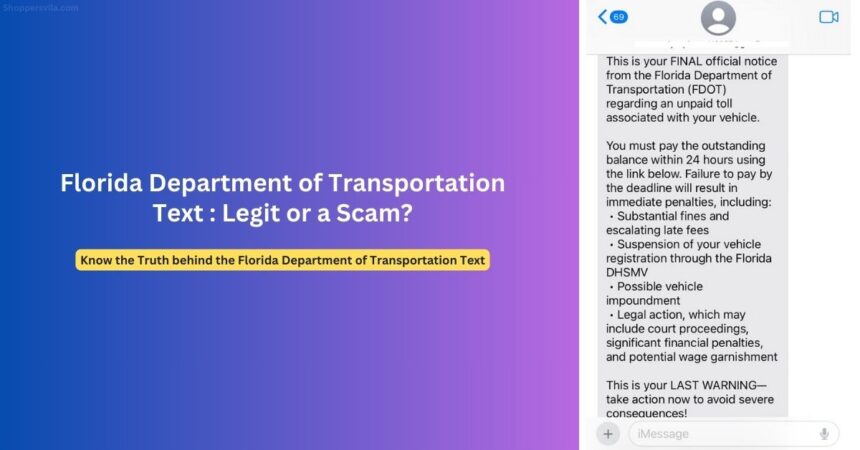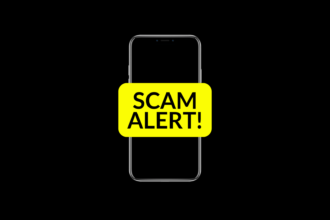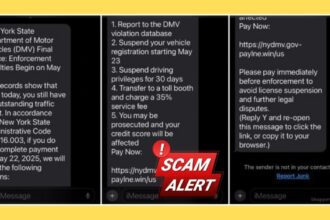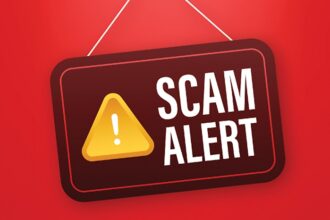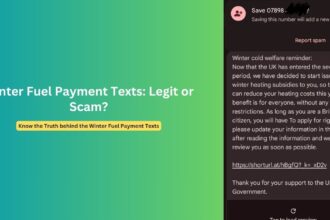Florida drivers and visitors alike are increasingly falling victim to a sophisticated scam targeting toll road users across the state. Messages claiming to be from the Florida Department of Transportation (FDOT) demand immediate payment for supposedly unpaid tolls, often arriving on smartphones with alarming “FINAL NOTICE” warnings. But as state officials and federal agencies warn, these communications are elaborate frauds designed to steal both money and identities.
Florida Department of Transportation (FDOT) Official Warning of the Toll Scam Text
The Florida Department of Transportation has issued an explicit warning about these fraudulent messages on their official social media channels: “BEWARE OF TOLL SCAMS. Scammers are posing as FDOT, FDOT Turnpike, SunPass and other toll agencies to defraud Floridians. Remember, FDOT will NEVER send a text message about toll invoices or balances.”
This unambiguous statement from FDOT clarifies their communication policies and has been echoed by SunPass, Florida’s official toll collection system. The Federal Trade Commission has also joined the warning chorus, publishing a nationwide alert titled “Got a text about unpaid tolls? It’s probably a scam.”
“Whether you’ve driven through a toll recently or not, you might’ve gotten a text saying you owe money for unpaid tolls,” states the FTC warning. “Scammers are pretending to be tolling agencies from coast to coast and sending texts demanding money.”
These coordinated warnings from multiple official agencies underscore the seriousness and prevalence of the scam operation targeting Florida’s highways and beyond.
The scheme typically begins with an unexpected text message claiming to be from FDOT, SunPass, or another official-sounding toll authority. These messages follow a calculated formula designed to create panic and prompt immediate action:
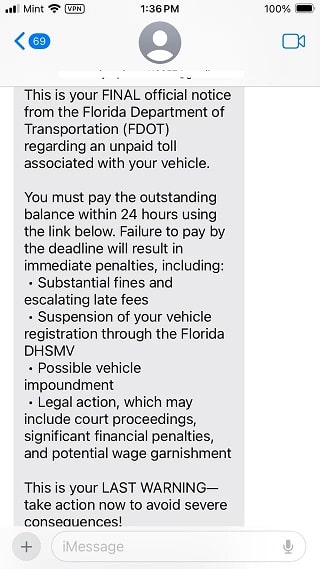
Florida Department of Transportation – FINAL NOTICE
This is your FINAL official notice from the Florida Department of Transportation (FDOT) regarding an unpaid toll associated with your vehicle.
You must pay the outstanding balance within 24 hours using the link below. Failure to pay by the deadline will result in immediate penalties, including:
• Substantial fines and escalating late fees
• Suspension of your vehicle registration through the Florida DHSMV
• Possible vehicle impoundment
• Legal action, which may include court proceedings, significant financial penalties, and potential wage garnishment
This is your LAST WARNING—take action now to avoid severe consequences!
[Pay Now] https://sunpass.com-mwiy.win/us
If the link does not work, reply “Y” to receive a new link or copy and paste it into your browser. No further notices will be sent.
This is your FINAL official notice from the Florida Department of Transportation (FDOT) regarding an unpaid toll associated with your vehicle. You must pay the outstanding balance within 24 hours using the link below. Failure to pay by the deadline will result in immediate penalties, including substantial fines, vehicle registration suspension, possible impoundment, and legal action.
What makes these scams particularly effective is their ability to target individuals with surprising accuracy. Some visitors to Florida have reported receiving these fraudulent notices at temporary addresses where they’re staying, raising serious questions about how scammers are obtaining this information.
One Texas resident visiting Florida shared their experience on social media: “I’m visiting a friend in Florida and staying with them for a few months. I assumed any toll invoices would be sent to my Texas address based on my license plate. But instead, FDOT somehow found where I’m currently residing at my friend’s house. This is kind of spooky to me.”
Red Flags That Expose the Fraud
Law enforcement and consumer protection agencies have identified several warning signs that distinguish these scams from legitimate communications:
- Delivery method: FDOT and SunPass explicitly state they never send text messages about toll invoices or balances. Official communications come through physical mail or specific email addresses.
- Urgency and threats: Scam messages typically demand payment within extremely short timeframes (often 24 hours) and threaten severe consequences like vehicle impoundment.
- Suspicious links: The payment links in these messages direct to spoofed websites with slightly altered URLs, such as “sunpass.com-mwiy.win” instead of the legitimate sunpass.com.
- Unusual sender information: Legitimate SunPass text messages only come from the number 786727, while emails only come from [email protected] or [email protected].
- Request for personal information: These scams often ask for sensitive details beyond what would be necessary for a simple toll payment.
“The common thread in these scams is that they demand immediate payment,” explains a SunPass consumer protection bulletin. “By forcing you to act quickly, you are less likely to question the request.”
The Technology Behind the Deception
What particularly concerns privacy advocates is how scammers are locating their targets. Several theories have emerged:
1. Sophisticated Data Mining
Security experts believe scammers may be purchasing or illegally accessing data from various commercial databases that track consumer behavior. When combined with publicly available information, this can create surprisingly detailed profiles of individuals’ movements.
2. License Plate Recognition Networks
Florida has an extensive network of automated license plate readers (ALPRs) used by law enforcement and private companies. Some security researchers speculate that data from these systems could be compromised or leaked.
One commenter on a social media thread suggested: “License plate readers have tracked your every move. Over time it learns your patterns and was able to establish an address.”
3. Insurance Database Access
Another potential vulnerability involves automobile insurance information. When drivers update their policies with temporary addresses or add locations where their vehicle will be garaged, this information enters databases that could potentially be accessed by sophisticated scammers.
A Florida insurance professional noted on social media: “We use a third-party company in the auto insurance world that captures pictures and locations of license plates in the public. I could likely tell where someone is staying for a few months if they don’t park the car in a garage.”
Is Florida Department of Transportation (FDOT) FINAL NOTICE Text Legit or a Toll Payment Scam?
The evidence is conclusive: any text message claiming to be a “FINAL NOTICE” from FDOT about toll payments is definitively a scam. Multiple official sources have confirmed this:
- FDOT’s explicit statement: “FDOT will NEVER send a text message about toll invoices or balances.”
- SunPass confirmation: The official toll system clarifies, “If SunPass needs to contact its customers, it will appear as follows: Email: [email protected] or [email protected]; Text: 786727.”
- FTC guidance: The federal consumer protection agency states unequivocally, “Whether you’ve driven through a toll recently or not, you might’ve gotten a text saying you owe money for unpaid tolls. It’s probably a scam.”
- Verified FDOT personnel: A self-identified FDOT employee responding to one victim called these notices “Absolutely a scam. Verify everything on that notice.”
These sources make clear that legitimate toll notices will only arrive via official mail to your registered address, through your SunPass account portal, or via the specific official channels mentioned above. Any text message with “FINAL NOTICE” language and payment demands is attempting to defraud you.
The Human Cost of the Scam
The financial impact of these scams extends beyond the immediate toll payments. Victims who click on fraudulent links risk:
- Identity theft: By capturing driver’s license numbers and other personal information, scammers can open accounts and commit fraud in victims’ names.
- Financial theft: Direct access to bank accounts or credit card information enables immediate monetary theft.
- Malware installation: Some phishing links install malicious software that continues to monitor the victim’s device and steal information over time.
“I just got scammed. Please be careful,” wrote one Florida resident on FDOT’s official warning post, illustrating the real impact these schemes have on unsuspecting victims.
How to Protect Yourself From Toll Payment Scams
Federal and state authorities have issued clear guidance on avoiding these increasingly sophisticated toll scams:
Verify Through Official Channels
Never click links in unexpected texts or emails about tolls. Instead, log in directly to your SunPass account through the official website (manually typing sunpass.com) or call the official Toll-by-Plate Program at (888) 865-5352.
Recognize Legitimate Communications
SunPass has clarified exactly how they contact customers:
- Official emails: Only from [email protected] or [email protected]
- Official texts: Only from the number 786727
- Official mail: Physical mail for toll violations comes with verifiable information and official letterhead
Report Suspicious Messages
The FTC recommends using your phone’s “report junk” feature or forwarding suspicious texts to 7726 (SPAM). Additionally, report toll scams to:
- The Internet Crime Complaint Center (IC3) at ic3.gov
- Florida Department of Transportation through their official website
- Florida Attorney General’s Office for consumer protection violations
Watch for Warning Signs
Be particularly suspicious of any toll notice that:
- Creates undue urgency with “final notice” language
- Threatens immediate negative consequences
- Contains suspicious links or attachments
- Requests payment through unusual methods
- Arrives via text message
A National Problem with Florida at the Epicenter
While Florida appears to be a hotspot for these scams, the Federal Trade Commission warns this is becoming a nationwide problem. Similar schemes have been reported in states including New Jersey, Texas, California, and throughout the Northeast corridor.
“Not just happening in state of Florida it’s nationwide,” confirmed one commenter on FDOT’s warning. “Share to loved ones in other states… authorities last I knew are aware and warning people.”
The prevalence in Florida may be attributed to several factors:
- The state’s extensive toll road network
- High volume of out-of-state visitors unfamiliar with local toll systems
- Multiple toll authorities operating within the state
Frequently Asked Questions
1. How can I verify if a toll notice is legitimate?
The only way to verify a legitimate toll notice is to contact FDOT or SunPass directly through their official channels. For SunPass, log in to your account at sunpass.com (type the URL manually, don’t click links) or call the official Toll-by-Plate Program at (888) 865-5352. Never use contact information provided in the suspicious message itself.
2. Why do scammers seem to know my temporary address in Florida?
Scammers may obtain temporary address information through various means, including data mining from commercial databases, compromised license plate reader networks, or potentially through insurance information updates. Some visitors have reported providing their temporary address to insurance companies, which may create data vulnerabilities.
3. What should I do if I already clicked a link in a toll scam text?
If you’ve already clicked a link and provided personal or financial information, take immediate action: monitor your accounts for unauthorized transactions, change passwords for any compromised accounts, contact your bank or credit card companies to alert them of potential fraud, and consider placing a credit freeze with the major credit bureaus. Report the incident to the Internet Crime Complaint Center (IC3) at ic3.gov.
4. Can I just ignore these text messages?
Yes, the safest approach is to delete these messages without clicking any links or responding in any way. Do not reply with “STOP” or any other text as this confirms to scammers that your number is active. Use your phone’s “report junk” feature or forward the message to 7726 (SPAM) before deleting.
5. Do legitimate toll violations ever come via text message?
No. Both FDOT and SunPass have explicitly stated they never send text messages about toll invoices or balances. Legitimate toll violations are communicated through official mail to your registered address or through official emails from [email protected] or [email protected]. SunPass will only send texts from the number 786727, and these will never contain payment demands.
Looking Forward: The Future of Toll Security
As toll collection increasingly moves toward electronic and cashless systems, the potential for scams will likely continue to evolve. Transportation authorities across the country are responding with enhanced security measures:
- Improved verification processes for official communications
- Stronger data protection for toll payment systems
- Public education campaigns about payment scams
- Coordination between state and federal agencies to track and prosecute scammers
While these measures help, consumer vigilance remains the most effective defense. “Don’t be rushed,” advises SunPass in their official guidance. “If SunPass needs to contact its customers, it will appear as follows…” with clear instructions on identifying legitimate communications.
For Florida residents and the millions of visitors who drive the state’s highways each year, the message is clear: when it comes to unexpected toll notices, verify before you pay, and remember that official agencies never demand immediate payment via text message.
As one FDOT employee commented regarding these scams, “Absolutely a scam. Verify everything on that notice.”
